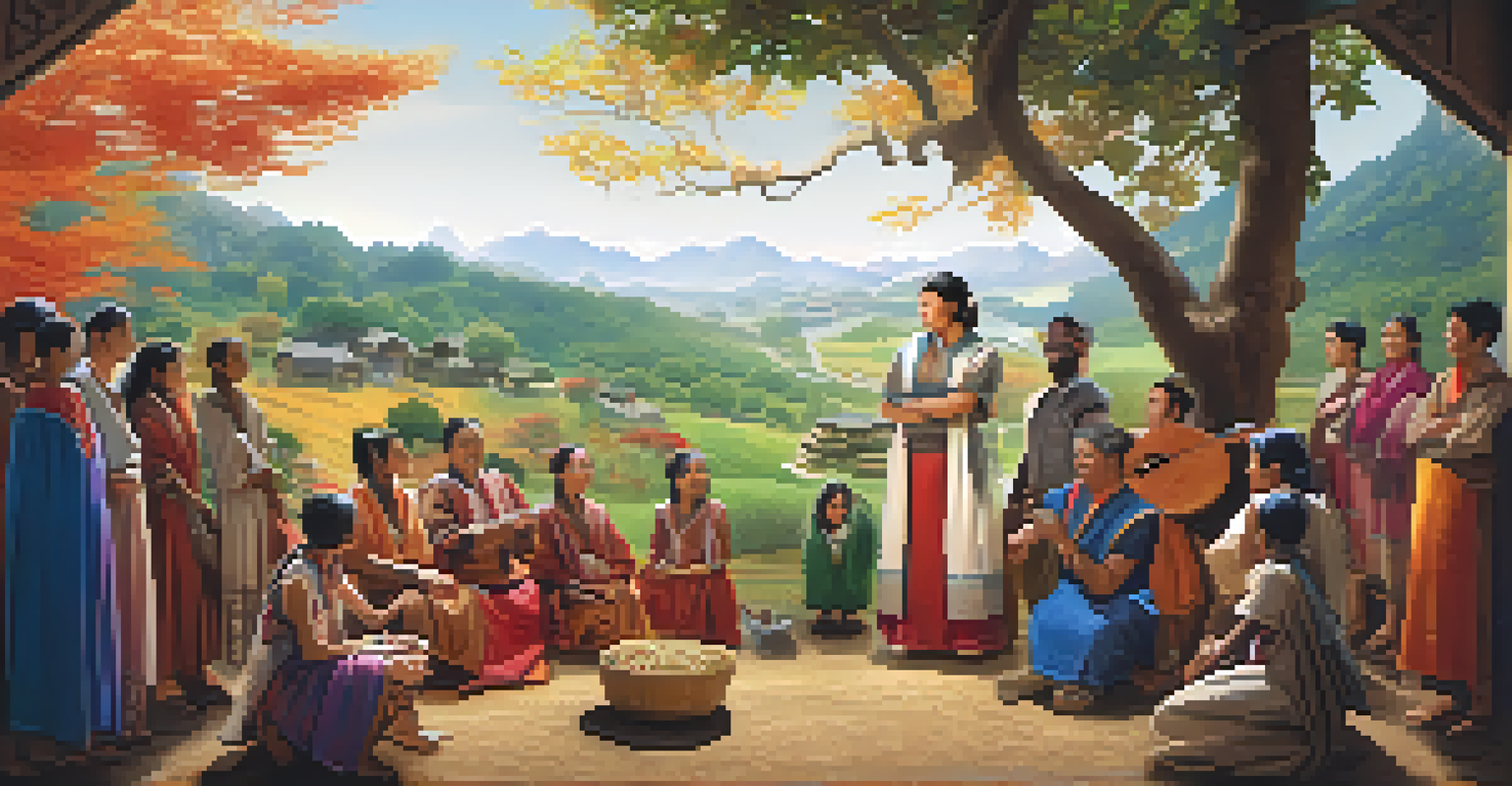Cultural Influences in Story Adaptation: A Global View

Understanding Story Adaptation Across Cultures
Story adaptation is the process of taking a narrative from one medium or culture and reshaping it for another. This can include turning a book into a movie, or a folktale into a modern play. Each culture brings its own values, beliefs, and storytelling techniques, which can significantly alter the original story.
A culture is not just a set of values and beliefs; it is a lens through which we view the world and tell our stories.
For example, consider the classic tale of 'Cinderella.' This story appears in various forms worldwide, from the French version by Charles Perrault to the Chinese 'Ye Xian.' Each cultural retelling emphasizes different morals and societal values, showcasing how local customs can influence the narrative.
As we delve into the nuances of these adaptations, it becomes clear that culture acts as a lens through which stories are interpreted and transformed, making them more relatable to local audiences.
The Role of Cultural Context in Storytelling
Cultural context plays a pivotal role in how stories are received and understood. When a story is adapted, the context in which it was originally told can either enhance or hinder its impact. For instance, humor and satire often rely heavily on cultural references that may not translate across borders.

Take the British sitcom 'The Office,' which was adapted in several countries, including the U.S. and Japan. While the core concept remains the same—an awkward office environment—the humor and character dynamics are tailored to resonate with each culture's sensibilities, resulting in varied reception and success.
Cultural Lens Shapes Story Adaptation
Different cultures reinterpret narratives, infusing them with local values and beliefs, as seen in the global variations of 'Cinderella.'
Thus, understanding the cultural backdrop is essential for storytellers aiming to create adaptations that feel authentic and engaging to their audience.
Adapting Folklore and Myths: A Cultural Journey
Folklore and myths are rich sources for adaptation, as they often embody the values of a culture. When adapting these stories, creators must navigate the delicate balance between honoring tradition and making the tale accessible for contemporary audiences. This can lead to innovative reinterpretations that breathe new life into age-old tales.
Stories are the most powerful way to connect with others, transcending the barriers of culture and language.
For example, Disney's 'Moana' draws from Polynesian mythology but adapts it to fit modern storytelling conventions. The film introduces audiences to the culture while ensuring that the story remains engaging and relatable. Such adaptations can foster greater awareness and appreciation of diverse cultures.
However, it is crucial for creators to approach these adaptations respectfully, ensuring that they represent the original culture authentically while also making necessary adjustments for wider appeal.
Cultural Sensitivity and Ethical Adaptation
As globalization connects us more than ever, the importance of cultural sensitivity in adaptations cannot be overstated. Misrepresenting or appropriating cultural elements can lead to backlash and alienate audiences. Therefore, it’s essential for creators to engage with cultural consultants and representatives during the adaptation process.
A notable example is the adaptation of 'The Little Mermaid' into a live-action film, which faced criticism for its casting choices. The conversation surrounding representation highlights the need for creators to be aware of cultural implications and the voices they include in their storytelling.
Cultural Sensitivity is Crucial
Engaging with cultural consultants during adaptations is essential to avoid misrepresentation and promote respect for original cultures.
Ultimately, ethical adaptation not only enriches the narrative but also promotes a deeper understanding and respect for the cultures being portrayed.
The Influence of Technology on Cultural Adaptations
Technology has revolutionized the way stories are adapted and shared across cultures. With the rise of streaming platforms, audiences can access a diverse array of content from around the globe, leading to a greater appreciation for international narratives. This accessibility has paved the way for adaptations that might have previously gone unnoticed.
For instance, the South Korean series 'Squid Game' became a worldwide phenomenon, demonstrating the power of technology in breaking down cultural barriers. The show’s unique blend of social commentary and entertainment resonated with viewers, leading to interest in similar cultural adaptations.
As technology continues to evolve, we can expect even more cross-cultural storytelling, allowing for a richer tapestry of narratives that reflect our global society.
The Impact of Audience Expectations on Adaptations
Audience expectations play a significant role in shaping story adaptations. When viewers come to a story that has been adapted, they often bring preconceived notions based on the original source material. This anticipation can influence how creators approach their adaptations, striving to meet or subvert these expectations.
A great example is the adaptation of 'Harry Potter,' which faced scrutiny from fans who had strong attachments to the original books. The filmmakers had to make strategic choices about which elements to include or omit to satisfy both newcomers and loyal fans, often leading to heated discussions about fidelity versus creative freedom.
Technology Expands Storytelling Reach
The rise of streaming platforms allows for greater access to diverse narratives, exemplified by the global success of 'Squid Game.'
Navigating these expectations requires a delicate balance, as creators must remain true to the essence of the story while also offering something fresh and engaging to the audience.
Future Trends in Cultural Story Adaptation
As we look to the future, the landscape of cultural story adaptations is likely to evolve further. With increasing globalization and cultural exchange, we can expect a surge in hybrid narratives that blend elements from multiple cultures. This trend can lead to innovative storytelling that reflects our interconnected world.
For instance, the rise of multicultural casts and narratives in Hollywood showcases a growing recognition of diverse voices. Films like 'Crazy Rich Asians' and 'Black Panther' are not only box office successes but also highlight the importance of representation and cultural authenticity in storytelling.

As these trends continue, we may find that the adaptations of tomorrow will be even more inclusive, fostering a deeper understanding of global cultures while captivating audiences with rich, multifaceted stories.